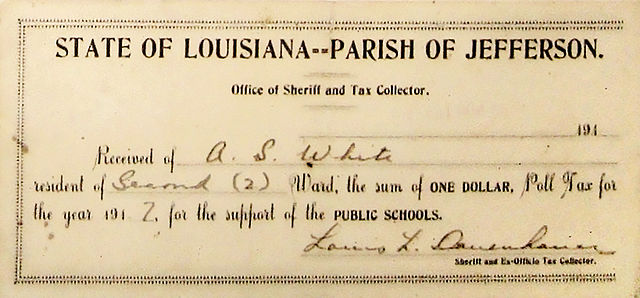Twenty-fourth Amendment to the United States Constitution
The Twenty-fourth Amendment of the United States Constitution prohibits both Congress and the states from conditioning the right to vote in federal elections on payment of a poll tax or other types of tax. The amendment was proposed by Congress to the states on August 27, 1962, and was ratified by the states on January 23, 1964.
The official Joint Resolution of Congress proposing what became the 24th Amendment as contained in the National Archives
Poll taxes in the United States
A poll tax is a tax of a fixed sum on every liable individual, without reference to income or resources. Although often associated with states of the former Confederate States of America, poll taxes were also in place in some northern and western states, including California, Connecticut, Maine, Massachusetts, Minnesota, New Hampshire, Ohio, Pennsylvania, Vermont, Rhode Island, and Wisconsin. Poll taxes had been a major source of government funding among the colonies which formed the United States. Poll taxes made up from one-third to one-half of the tax revenue of colonial Massachusetts. Various privileges of citizenship, including voter registration or issuance of driving licenses and resident hunting and fishing licenses, were conditioned on payment of poll taxes to encourage the collection of this tax revenue. Property taxes assumed a larger share of tax revenues as land values rose when population increases encouraged settlement of the American West. Some western states found no need for poll tax requirements; but poll taxes and payment incentives remained in eastern states. Poll taxes became a tool of disenfranchisement in the South during Jim Crow, following the end of Reconstruction. This persisted until court action, following the ratification of the 24th Amendment in 1964, ended the practice.

Receipt for payment of poll tax, Jefferson Parish, Louisiana, 1917 (equivalent to $24 in 2023)


